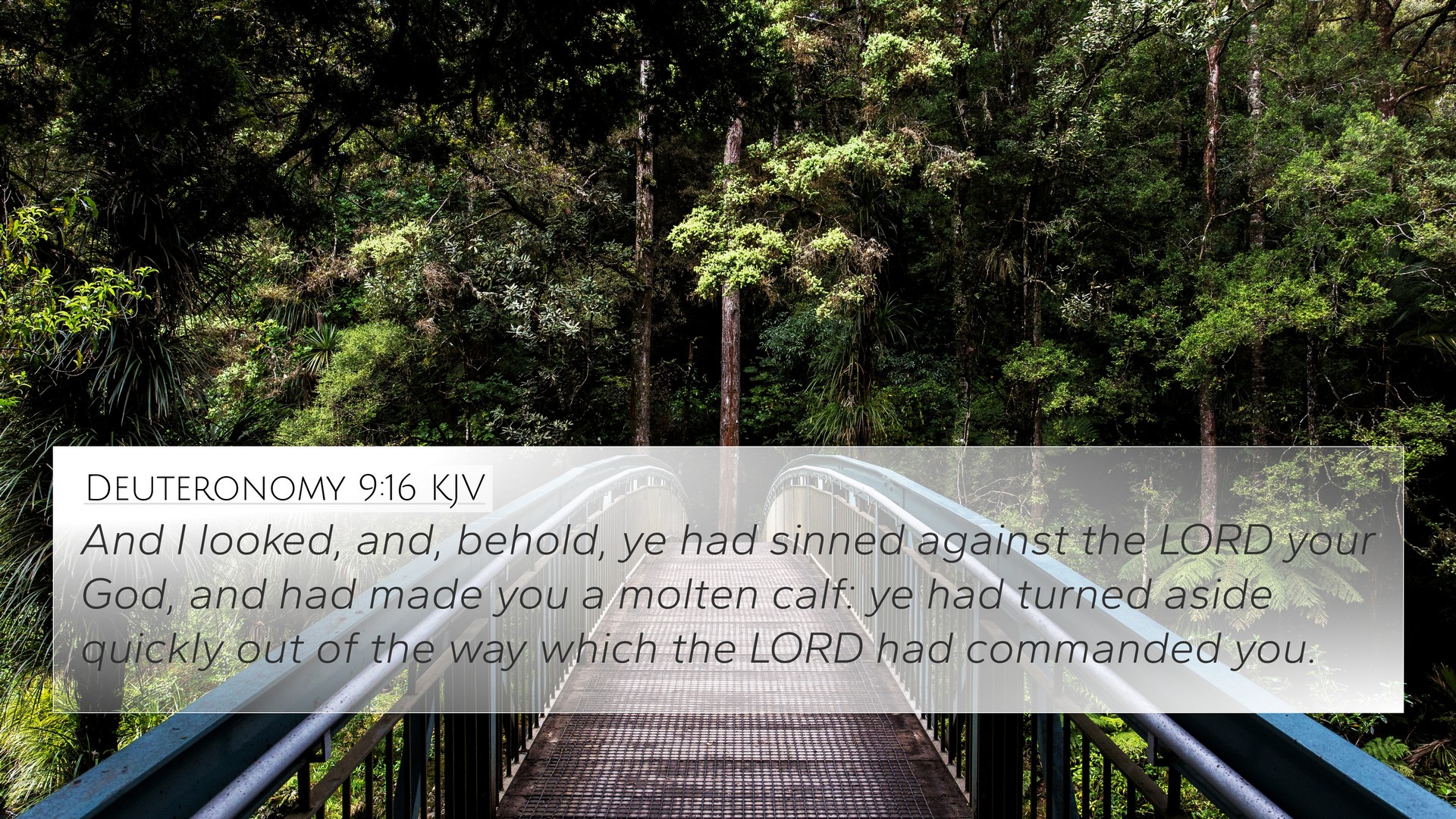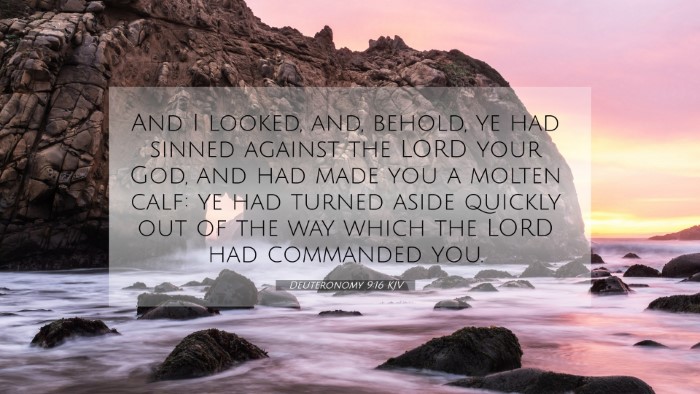Understanding Deuteronomy 9:16
Verse: "And I looked, and, behold, ye had sinned against the Lord your God; ye had made you a molten calf: ye had turned aside quickly out of the way which the Lord had commanded you." (Deuteronomy 9:16)
Summary of Meaning
This verse presents the moment when Moses reflects on the sinful actions of the Israelites after their deliverance from Egypt. The significance of the molten calf symbolizes idolatry, a blatant act of disobedience against God’s command. This passage highlights both the consequences of turning away from God and the mercy of God in facing the stiff-necked people.
Insights from Public Domain Commentaries
- Matthew Henry: Henry emphasizes the severity of Israel's sinfulness, illustrating that even after experiencing miraculous salvation, they quickly turned to idolatry. His commentary encourages an examination of human tendency to stray from divine guidance and the consequential need for repentance.
- Albert Barnes: Barnes explains that Moses' words serve as a reminder of the covenantal relationship between God and Israel, interpreting their actions as a breach of trust. He highlights the gravity of creating idols and asserts that this act provoked God's anger.
- Adam Clarke: Clarke offers insight into the spiritual implications of idolatry, portraying the molten calf as a representation of failure to acknowledge God’s sovereignty. He points out the necessity of constant vigilance to remain on the proper spiritual path and warns against the quickness to abandon God’s commandments.
Cross-References and Thematic Connections
This verse can be cross-referenced with various other scripture passages, which together illustrate themes of sin, idolatry, and God's mercy:
- Exodus 32:1-6: The original account of the making of the golden calf.
- Acts 7:39-41: Stephen's speech references the golden calf, highlighting Israel’s rebellion against God.
- 1 Corinthians 10:7: Paul warns the Corinthians about idolatry using Israel's past as an example.
- Romans 1:23: Describes how people exchanged the glory of God for images, echoing the sin of the calf.
- Psalm 106:19-20: Reflects on the Israelites’ folly in making an image and forsaking their Redeemer.
- Hosea 8:4: Critiques the Israelites for setting up kings without divine approval and making idols.
- Hebrews 3:12: Warns Christians to avoid an evil, unbelieving heart that turns away from the living God.
Connections and Comparative Analysis
The connections between these verses allow for a rich thematic study:
- Thematic Bible Verse Connections: The shared theme of disobedience throughout these scriptures highlights the consequences of turning away from God.
- Bible Verse Parallels: The reflection on idolatry in both the Old and New Testament shows the unchanging nature of God’s commandments and the ongoing struggle against sin.
- Scriptural Cross-Referencing: Linking these texts provides a comprehensive view of the nature of sin in both the historical context of Israel and the application for New Testament believers.
Conclusion
Deuteronomy 9:16 serves as a significant reminder of the human inclination towards sin and the importance of fidelity to God. Through cross-referencing with other Bible verses, we can deepen our understanding of the scripture, recognizing the repeated themes of idolatry and mercy throughout the biblical narrative. This verse stands as a powerful testament to the need for vigilance in faith and adherence to God's commands, encouraging believers to seek continual alignment with divine will.
Tools for Bible Cross-Referencing
For those interested in further study, various tools and resources can aid in cross-referencing:
- Bible Concordance: Use a concordance to locate and understand related verses quickly.
- Bible Cross-Reference Guide: Such guides provide structured pathways through the scripture based on themes and topics.
- Cross-Reference Bible Study: Engage in a study that links various scriptures thematically and contextually.
User Intent Keywords
Addressing user queries like "What verses are related to Deuteronomy 9:16?" or "How do Exodus and Acts connect?" serves to enrich this study, showcasing the relevance of these scriptures across the testament continuum.




